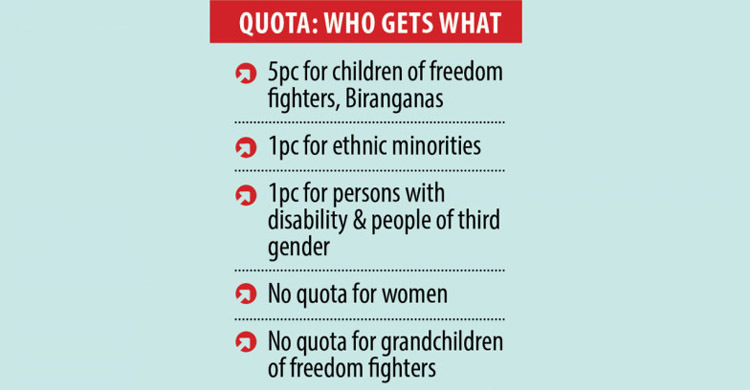Govt now eyes overhauling 7% quota in govt jobs

The quota reform movement has reshaped Bangladesh’s political landscape. Prime Minister Sheikh Hasina, who ruled for nearly 16 years, was ousted following a turbulent student movement centring the issue.
This movement led the then-Awami League government to introduce a 7 per cent quota system in government jobs which actually failed to satisfy the leaders of the Anti-Discrimination Student Movement. They are pushing instead for more comprehensive changes to the quota system.
With the interim government now in power, discussions are emerging on the future of quota distribution in government job recruitment. While the interim administration has yet to issue new recruitment circulars, the 7 per cent quota system implemented by the Awami League is once again under review, especially for upcoming recruitments such as the 47th BCS. Internal discussions suggest potential adjustments to the existing quotas.
Calls for rational quota reform
The anti-discrimination student movement is advocating for “rational reforms” in the quota system. They propose an increase from the 7 per cent quota and have called for new quotas benefiting women and underprivileged communities. Discussions are also underway on whether the freedom fighter quota, currently at 5 per cent, should be reduced.
According to sources at the Ministry of Public Administration, preliminary discussions on potential reforms are ongoing. The ministry has indicated it will consider and act on any formal proposals from the student movement’s leadership.
Quota distribution in government jobs: a historical overview
Until 2018, 56 per cent of government job posts were reserved under various quotas. That year, students nationwide began a movement calling for a “logical reform” of the quota system. However, Prime Minister Sheikh Hasina announced the abolition of quotas entirely—a decision she later admitted was made in frustration. On October 4, 2018, a government notification officially canceled the quota for first and second-class positions (9th to 13th grade), though quotas remained for Class III and IV posts. This system was upheld until 2021, when the High Court ruled to restore the previous 56 per cent quota structure, sparking another wave of student protests.
In response to mounting pressure, the Supreme Court eventually ruled on July 21 to set the quota at 7 per cent: 5 per cent for freedom fighters, 1 per cent for ethnic minorities, and 1 per cent for people with disabilities and the third gender. The remainder, 93 per cent, would be allocated based on merit.
The role of the Anti-Discrimination Student Movement
The Anti-Discrimination Student Movement, formed to demand fair quota reforms, became a central player in the recent political shift. Following the fall of the Awami League government on August 5, the movement’s leaders, including coordinator Hasnat Abdullah, remain active in advocating for changes, though progress has been slow under the interim government.
In a recent talk show, Abdullah reaffirmed their call for “rational reform” of the quota system, emphasising that the former government’s approach excluded key stakeholders, including women and marginalised communities. “We need a system that includes all communities fairly,” Abdullah said.
Pressure for quick decisions
The Public Service Commission (PSC), preparing for the 47th BCS circular in November, has urged the government to clarify its position on quotas to avoid delays. Anand Kumar Biswas, Controller of Examinations at the PSC, emphasised that timely decisions are crucial to prevent legal and administrative bottlenecks.
An official from the Directorate of Primary Education also noted that uncertainty over the quota system had delayed the release of results for the third phase of recruitment, impacting thousands of candidates.
Government's positive stance on quota reform
The Ministry of Public Administration has signaled a willingness to reform the quota system if prompted by the anti-discrimination movement. Officials hint that the freedom fighter quota may be reduced, with the difference reallocated to support women, ethnic minorities, and underserved communities.
Additional Secretary Abdur Rauf confirmed that any modifications would be aligned with the 2024 Supreme Court ruling. Additional Attorney General Barrister Aneek R Haque noted that further legal measures may be needed for substantive changes.
A potential shift in quota policy
The Ministry of Public Administration appears receptive to student demands for quota reform, with indications that new recommendations could lead to a revised quota distribution system in government jobs. For now, the political and legal landscape around quotas remains fluid, with further clarity expected in the coming months.

